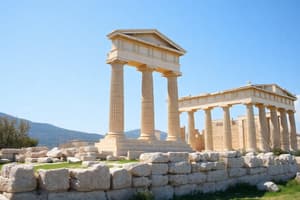Podcast
Questions and Answers
What are the three titles of Residents in Ancient Athens?
What are the three titles of Residents in Ancient Athens?
- Citizens, Migrants, and Refugees
- Residents, Visitors, and Foreigners
- Residents, Settlers, and Nomads
- Citizens, Metics, and Slaves (correct)
What is the basis of Democracy?
What is the basis of Democracy?
- It is fair that citizens be allowed to rule themselves (correct)
- Individual rights are the highest value
- Majority rule is fair
- The common good is the highest value
Which group of people did not have voting rights in Ancient Athens?
Which group of people did not have voting rights in Ancient Athens?
- Women and Metics
- Citizens and Migrants
- Metics and Slaves
- Women, Metics, and Slaves (correct)
What is NOT a pillar of modern Democracy?
What is NOT a pillar of modern Democracy?
What is a key concept in mapping skills?
What is a key concept in mapping skills?
Which of the 6 building blocks of Athenian Democracy is MOST similar to modern Canadian Democracy?
Which of the 6 building blocks of Athenian Democracy is MOST similar to modern Canadian Democracy?
What can be inferred about ancient Athenian society?
What can be inferred about ancient Athenian society?
What is a key difference between ancient Athenian Democracy and modern Democracy?
What is a key difference between ancient Athenian Democracy and modern Democracy?
What was the primary requirement for citizens to participate in the Assembly?
What was the primary requirement for citizens to participate in the Assembly?
What was the main characteristic of an oligarchy?
What was the main characteristic of an oligarchy?
What was the name of the Athenian council that consisted of 500 members?
What was the name of the Athenian council that consisted of 500 members?
What was the primary function of the Athenian courts?
What was the primary function of the Athenian courts?
What was the significance of the Trojan War in Greek history?
What was the significance of the Trojan War in Greek history?
What was the primary method of voting in Athenian Democracy?
What was the primary method of voting in Athenian Democracy?
What was a major criticism of Athenian Democracy?
What was a major criticism of Athenian Democracy?
What was the primary role of women in Athenian Democracy?
What was the primary role of women in Athenian Democracy?
Flashcards are hidden until you start studying
Study Notes
Mapping Skills
- A map of ancient Greece is essential to understand directions, scale, titles, and legends.
Athenian Roles
- Residents of Ancient Athens consisted of:
- Citizens: had rights, freedoms, and responsibilities
- Metics: non-Athenian free people with limited rights
- Slaves: had minimal rights and performed laborious tasks
Gender Roles and Responsibilities in Athenian Society
- Understanding of gender roles and responsibilities in Ancient Athens is crucial
- Compare and contrast roles and responsibilities of both genders
The Building Blocks of Athenian Democracy
- 6 building blocks of Athenian Democracy must be identified and compared with modern Canadian Democracy
- Key idea: citizens should be allowed to rule themselves
- Principles:
- Majority rule (more than 50%) is fair
- People of the same social class should have equal rights
- Women, slaves, and metics were denied voting rights
- Slavery was an accepted part of Athenian society
- Individual and minority rights were not considered in Athenian democracy
- The common good was the highest value
Decision Making in Athenian Democracy
- 3 pillars of Athenian Democracy:
- The Assembly: all male citizens had the right to belong and vote
- The Council of 500
- The Court
- Students should understand the structure and function of each pillar
Introduction to Athenian Democracy
- Athens was part of ancient Greece, comprising various city-states
- Greek history reflects diverse forms of governance: monarchy, oligarchy, and democracy
Geographic and Historical Context
- Greece features mountainous landscapes and islands
- Major events in Greek history include the Minoan and Mycenaean civilizations, the Trojan War, and the rise of democracy
Forms of Government
- Monarchy: ruled by a single power or tyrant
- Oligarchy: governed by a small group of wealthy citizens
- Democracy: power vested in the people, with elected officials and citizen participation
Athenian Democracy
- Democracy emerged in Athens around 508 BC, emphasizing "people power"
- Key governmental bodies: the Ecclesia (assembly), the Boule (council), and the courts
Democratic Processes
- Voting: citizens participated in decision-making through methods like placing pebbles in vases
- Eligibility: only male citizens who met specific criteria could vote, excluding women, slaves, and foreigners
Studying That Suits You
Use AI to generate personalized quizzes and flashcards to suit your learning preferences.




